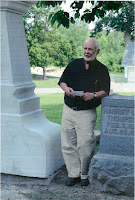 W. William Wimberly II, the author of the new IHS Press book Hanna's Town: A Little World We Have Lost, was well placed to write a history of Wabash, Indiana. Wimberly was raised in the community and it was there that his father served as a minister for thirty years. Here he talks about his experiences with the book,
W. William Wimberly II, the author of the new IHS Press book Hanna's Town: A Little World We Have Lost, was well placed to write a history of Wabash, Indiana. Wimberly was raised in the community and it was there that his father served as a minister for thirty years. Here he talks about his experiences with the book,What inspired your to write Hanna's Town?
1. I grew up from age one in an old, faded-elegant part of Wabash, wondering how such an elaborate town happened, and noting that the past seemed more lavish, more exuberant than its present appearance. 2. As a teen I learned that a small, rather remote, park in town had once been its cemetery and that it was named for a Mr. Hanna who founded Wabash. 3. When I was a junior-year-abroad student in Britain my mother asked me to check up on some remote Scots-Irish ancestors named Hanna: I realized I might have a family connection with Wabash's founder (There is but it's distant)... and yet I still didn't know how Hanna's Town grew into the faded-elegant town that raised me ... so I wrote a book ... and the fact that I had never used my Ph.D. in history helped snag me. Once retired to Wabash I had no excuse.
What was the toughest part of doing your research?
Following my father's advice to "keep the seat of the pants attached to the seat of the chair" while taking notes from the county museum's exensive collection of local newspapers back to 1847. It seemed to take forever.
What about Wabash surprised you the most?
1. The chronically awful condition of streets (dirt, mud, steep): bad surfaces right up to the end of the nineteenth century, and cruelly steep until cut down in the 1860s. 2. The prevelance of prostitution, possibly institgated by the presence of canal hands in the early days, perpetuated later by rail laborers, etc., but also eventually catering to upper crust clients rather openly. 3. The founders' capacity for multi-tasking: managing up to several business enterprises at once, while at the same time being deeply involved in religious, fraternal, political and community-improvement projects.
Is there a personality from the period covered that especially caught your attention?
I usually name Naaman Fletcher, journalist and newspaper publisher. He was incidentally one of the founders of Phi Gamma Delta, before he moved to Wabash. He died too young, but in his brief career he was an untiring candidate for civic improvements: he articulated a bright future for Wabash but he also scolded his readers cuttingly for failure to improve Wabash culturally and structurally more quickly. A secular Old Testament prophet was Naaman Fletcher.
How well does Wabash remember its past?
Not especially well. Many folks know about the US/Native American treaty of 1826; that Hugh Hanna was the founder; that canals and railroads were formative; and that it was the "first electrically lighted city in the world." The knowledge is largely anecdotal and out-of-context, verbal hand-me-down stuff. Interest has been raised by the excellent refounding of the county museum, a showpiece. Of course, now there will be no excuse for not knowing.
Do you plan another book on Wabash?
Not as a sequel to Hanna's Town. A good friend, Pete Jones, has, over his career (history teacher, journalist), already done a huge chunk of the research for the twentieth century. I encourage him to pick up where I left off--and I think he will do it. I have been laying groundwork for another kind of work, more in the memoir/history genre, set mostly in Wabash in the late twentieth century, but what will come of that only time will tell.
1 comment:
"Wonderful prose. The prologue carries the reader on a journey through a picturesque labyrinth of the history and people of Hanna's town. Wimberly's book should be required reading for Wabash High's social studies classes." -- The Marbled Page
Post a Comment